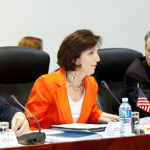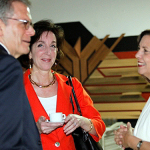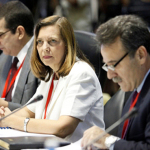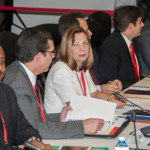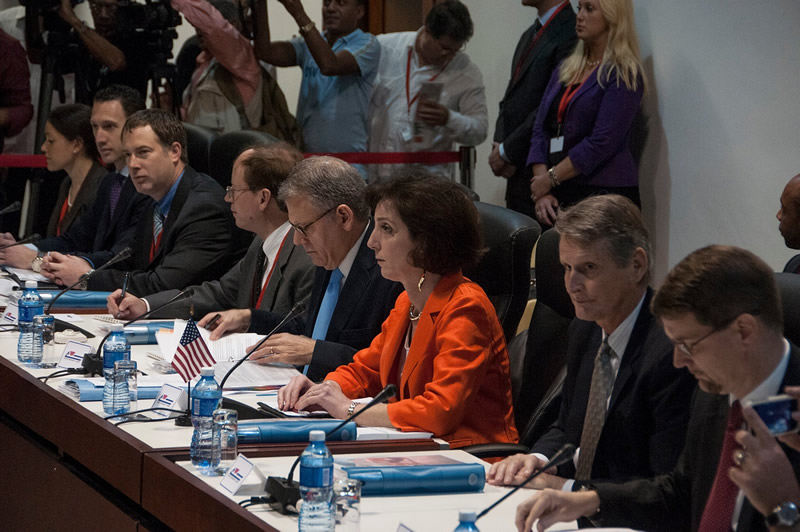
Report on the Cuba-U.S. talks (Second day)
“We talked about the principles on which relations must be established.”
HAVANA, Jan. 22, 11:40 a.m. — A “productive” exchange is how Gustavo Machín, deputy director for U.S. Affairs at the Cuban Foreign Ministry, described the process begun today between both delegations with the objective of instrumenting and formalizing diplomatic relations, as agreed upon by the presidents of Cuba and the United States last Dec. 17.
As we mentioned in a previous note, this is the first step, consisting in reestablishing relations to proceed later to a normalization, which would come once the respective diplomatic centers are in place.
“The meeting was respectful and relaxed,” Machín said. “We are exchanging the practical steps and have talked about the bases on which diplomatic relations should be reestablished, according to the principles of International Law and the Vienna Convention.”
To underline the cordial understanding, Machín told reporters: “Look at my face.”
According to the Cuban functionary, both parties have made note of the various proposals. “We’re going to continue until we formalize these relations,” he said.
Machín declined to answer questions after clarifying that he was only keeping the press abreast of the process. He said that reporters could shortly ask questions directly to the chiefs of the delegations.
A hot topic of the Cuba-U.S. talks
HAVANA, Jan. 22, 11 a.m. — In the press room of the Palace of Conventions, correspondents write their reports. Others, in the hallways, exchange guesses (in various languages), news tips and dare to imagine the content of the statements that will be made by spokesmen for both sides.
There is speculation about the difference between the “establishment” of relations and their “normalization,” a distinction made by a high-ranking unidentified official of the Cuban Foreign Ministry that was published in some media. Some colleagues think that it is an elegant way to point out that “this won’t be finished tomorrow.”
On this issue, they’re right; more than 50 years of confrontation do not vanish in a few conversations. For our part, we prudently opine that there is a minimum two-step process already agreed upon by both parties:
- A timetable for the reestablishment of diplomatic relations that implies a minimum of basic actions that are relatively easy to implement.
- Normalization of relations, the “main course” of the debate, which includes the issues of retribution for the properties nationalized in the 1960s; human rights (which promises to be interesting because some complaints have a double edge); retribution to Cuba for the damages caused by the blockade; the inclusion of the state sector in the possible financial investments by the U.S.
So far, Washington’s emphasis — replicated in Miami — is nothing but the highly touted “empowering of civil society.”
But one point that possibly will appear today in the statements by the parties is the return to the United States of persons sought by justice and living in Cuba. Obviously, Havana could insist on the return to either Venezuela or Cuba of Luis Posada Carriles and other criminals.
We shouldn’t be surprised if sometime today this issue pops on the pages of the printed and electronic media.
Breakthrough or breakdown?
HAVANA, Jan. 22, 10 a.m. — Back in 1975, Cuban Foreign Minister Raúl Roa García, said that when it came to sit down at the negotiating table with the United States it was necessary to wear silk gloves, not the traditional leather boxing gloves.
He meant the art of diplomacy in action, the ability to negotiate from irrefutable positions, calling for common sense in the face of arrogance, overbearing and even chauvinism. No “barricade language” and much tact, every word carefully chosen so it leaves no space for doubt or misinterpretation.
Yesterday (Jan. 21), the subject of the talks was the migratory issue, as the 1994-95 accords were reviewed, without convincing the U.S. side that the Cuban Adjustment Act and the “dry-feet-wet-feet” policy goes counter to the agreement to provide a legal, safe and orderly migration process.
This morning, the delegations returned to the table to deal with weighty issues involving the opening of embassies. From there, the talks will go into bilateral affairs and areas of cooperation in topics of mutual interest.
It’s not surprising, as happened yesterday, that we reporters are summoned to hear preliminary statements from some Foreign Ministry official before the final statements are made to the press and the world, which is following with great interest the activities in the Palace of Conventions here.
On the Cuban side, Josefina Vidal; on the U.S. side, Roberta Jacobson, both with their respective team of aides and assistants.
Days ago, a Cuban analyst cautioned that we should be prepared for a reprise of Antonio Maceo’s warning to the Spaniards at Baragua on March 15, 1878 (“The truce ends on the 23rd!”) but the situation right now does not predict a sharp confrontation. What’s needed at this point, as Roa said, is silk gloves.
We’ll find out soon.
*Reporting from the Palace of Conventions are our correspondents Aurelio Pedroso and Manuel Alberto Ramy.
See: The resumption of diplomatic relations Cuba-USA: Press releases

